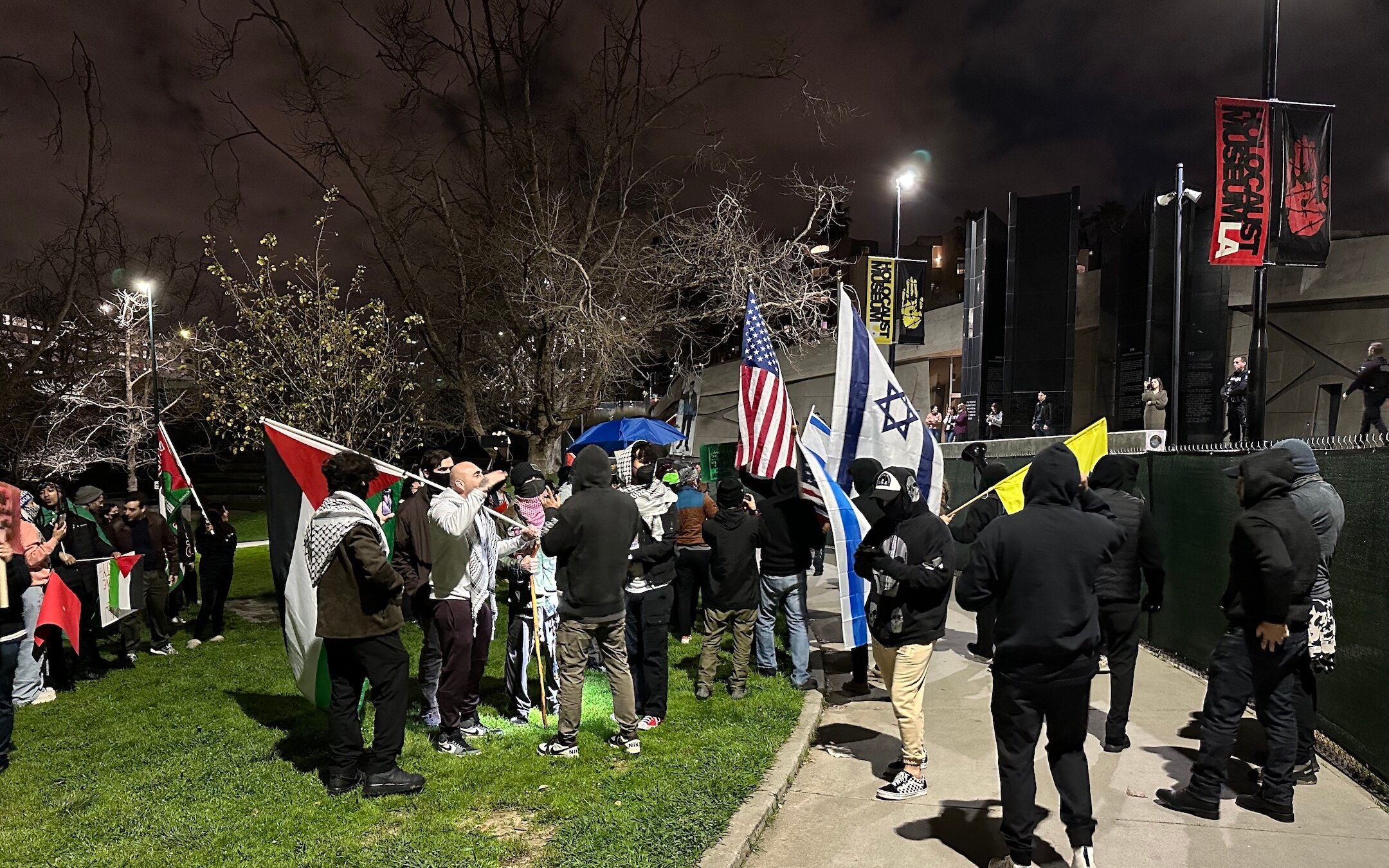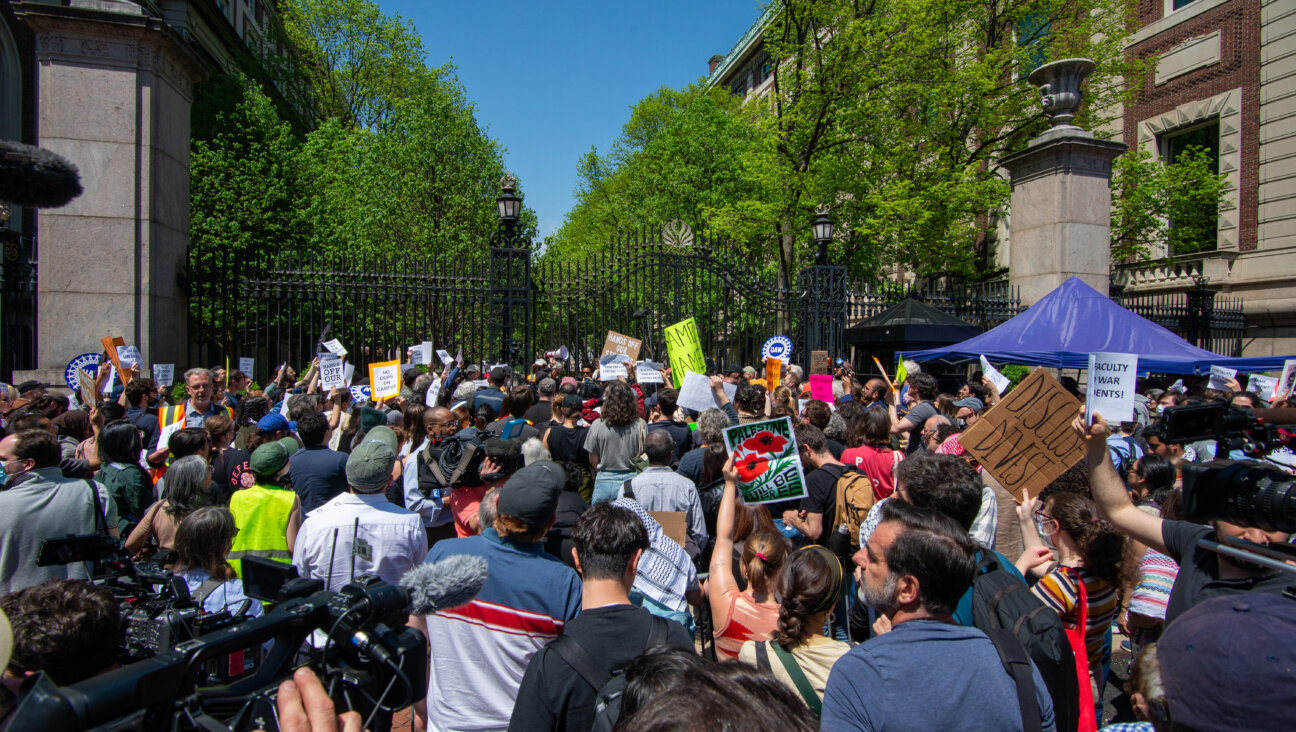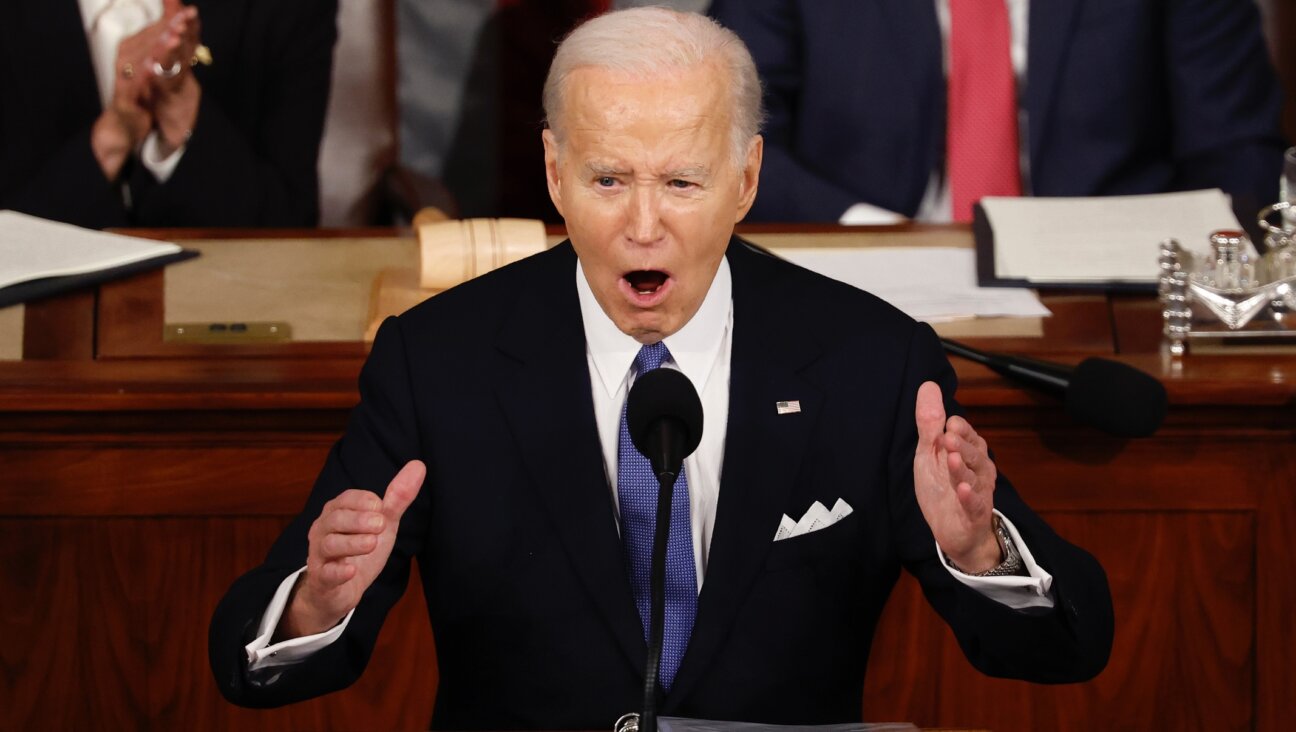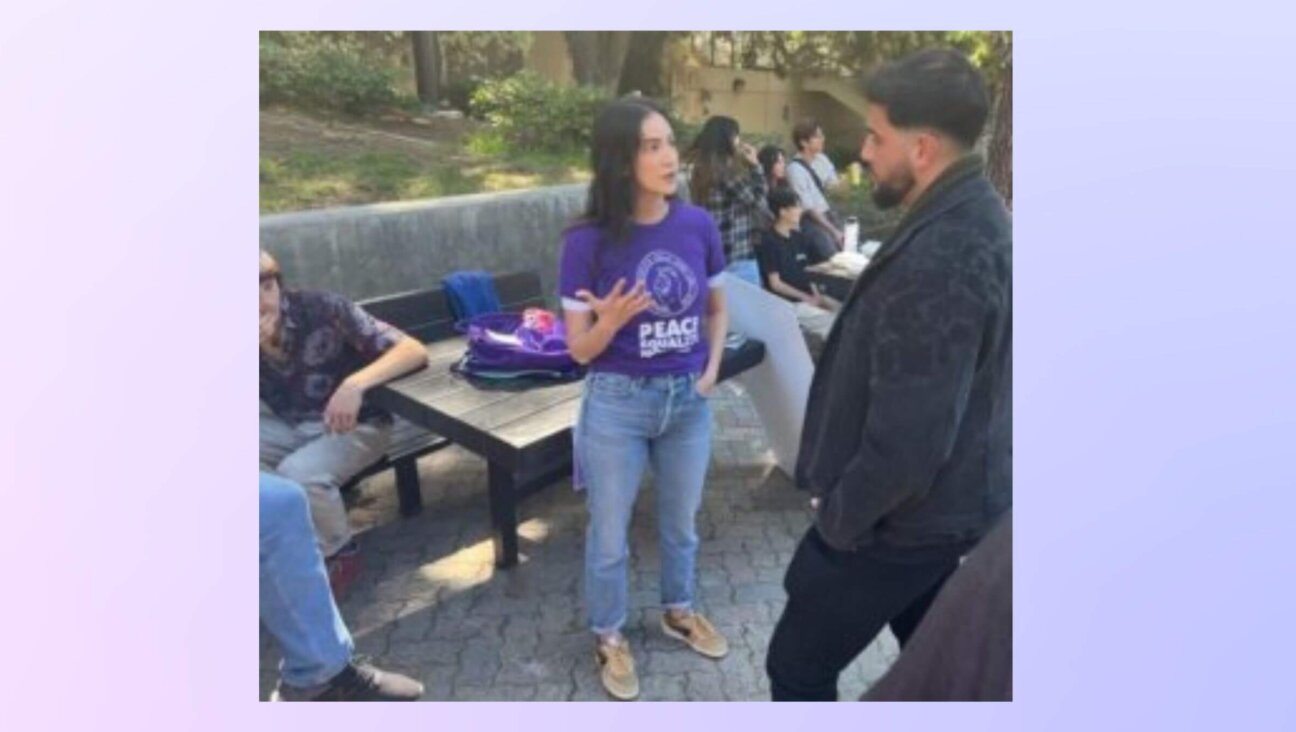Israeli speaker whose Berkeley event was canceled amid violence draws protest at LA Holocaust Museum speech

Pro-Palestinian and pro-Israeli protesters faced off outside a planned speech by Ran Bar-Yoshafat, the Israeli reservist and advocate whose speech at the University of California, Berkeley, was derailed, Los Angeles, Feb. 29, 2024. (Jacob Gurvis)
LOS ANGELES (JTA) — As a member of the Israeli military who frequently speaks on Israel’s behalf, Ran Bar-Yoshafat is used to being heckled by anti-Israel protesters, especially on college campuses.
But he says what happened to him at the University of California, Berkeley this week — where a planned appearance was canceled because of a protest that turned violent — was on a different level.
“They’re giving [a] prize to the violent side, and basically shutting down the person who wants to speak,” Bar-Yoshafat told the Jewish Telegraphic Agency. “I didn’t get a chance to even say, ‘Hello, my name is Ran.’”
Bar-Yoshafat’s scheduled appearance on Thursday at Los Angeles’ Holocaust museum, three days after the Berkeley incident, took place without interruption — although several dozen protesters amassed outside and later clashed with pro-Israel demonstrators who arrived.
“We are not protesting the Holocaust museum,” one of the leaders of the protest announced over a loudspeaker as the group began its demonstration. “We are protesting an IDF soldier.”
She made sure the group knew Bar-Yoshafat’s name, then led chants that included, “Yoshafat, you can’t hide, you committed genocide.”
Israeli soldiers and former soldiers have faced protests around the world since the outbreak of the Israel-Hamas war, which began when Hamas attacked Israel on Oct. 7. In England, a university rabbi who left to join the reserves faced death threats upon his return. In Canada, a champion athlete had an International Women’s Day speech canceled over her long-ago IDF service. And events featuring IDF soldiers organized by pro-Israel campus organizations have drawn protests at colleges and universities across the United States, including at Georgetown University and SUNY New Paltz this week.
In addition to being a reservist who recently spent 100 days fighting in Gaza, Bar-Yoshafat is an attorney and longtime advocate for Israel who has spoken on its behalf in the United States for decades. (He is also deputy director of the Kohelet Policy Forum, the conservative Jerusalem think tank behind the judicial overhaul that divided Israelis last year.)
So he has had experience facing protests before. He recalled an incident that occurred at the University of California, Davis about 12 years ago, when protesters interrupted a speech he gave. He said the university handled it smoothly and allowed the event to proceed.
“People don’t have to like me,” he said. “They can come and have a walkout, which is, I think, immature, but they’re allowed to do so.”
What happened at Berkeley, he said, was different. There, his talk was derailed after hundreds of pro-Palestinian protesters blocked the venue, smashed windows and, according to some accounts, physically attacked students who had come for the event. The setting for Bar-Yoshafat’s speech had been moved, but the university police decided to evacuate the space at the last minute, saying that they could not guarantee students’ safety. UC Berkeley Police are now investigating the incident.
Bar-Yoshafat said he was “surprised by the magnitude of their violence” and had expected Berkeley to be better prepared with security.
“They physically attacked students, spat on them, verbally attacking and physically assaulting them,” he said. “And the university was punishing me. I didn’t say a word.”
Berkeley, where student activists in the 1960s formed a Free Speech Movement advocating for unconstrained political speech on campus and touching off a wave of student civil disobedience, has seen multiple instances of unrest in recent years over right-wing speakers coming to the school. Protests of far-right provocateur Milo Yiannopoulos in 2017 caused a reported $100,000 in damage, while six people were arrested while protesting a 2019 speech by the commentator Ann Coulter.
Ultimately, Bar-Yoshafat held a small talk at a different location in Berkeley. And on Thursday night, he addressed about 70 people at the L.A. Holocaust museum.
Jen Stock, the L.A. regional director for Club Z, the Zionist youth organization that put on the event, told JTA that the lecture’s schedule had been altered to prevent museum-goers from encountering the anticipated protests.
The museum had its usual security staff on hand, and a group of LAPD officers arrived moments before a pro-Palestinian protest began in the park directly outside the museum. Attendees had to be checked in by security in order to enter the building.
The protesters, some of whom represented the Palestinian Youth Movement organization, arrived bearing Palestinian flags, signs and megaphones. Many wore keffiyehs and other face coverings, while one carried a baby doll painted with fake blood.
The group of roughly two to three dozen protesters began chanting variations of “Free Palestine” and anti-Israel phrases, some of which specifically named Bar-Yoshafat and U.S. President Joe Biden.
Tensions rose when a smaller group of pro-Israel counterprotestors arrived, waving Israeli and American flags. The two sides began yelling at each other, calling each other Nazis, terrorists and obscenities.
One pro-Palestinian protester, who declined to share his name, said he is a U.S. military veteran and is fed up with American support for Israel.
“How in the world can the U.S. support killing women and children?” he asked. “This s— is unforgivable.”
An Israeli counter-protester, who also declined to share his name, said the pro-Palestinian activists had been brainwashed and claimed without evidence that they were protesting for money.
“They’ve never been to Gaza, “ he said. “They’re just getting paid to be here.”
A few times throughout the roughly two-hour protest, members of the pro-Palestinian and pro-Israeli camps grew heated, though there was no violence beyond the occasional shove. LAPD officers watched from outside the museum, shining flashlights on people when they got physical.
Michael Weintraub, a Los Angeles local who attended Bar-Yoshafat’s speech, said he was aware of the incident at Berkeley, and called the protesters outside the L.A. event “misguided.”
“They have an agenda that allows them to see things that are almost make-believe,” he said.
Bar-Yoshafat said the string of Israeli soldiers having events canceled, moved online or disrupted was an issue of free speech — one that he would be carrying with him as he returns home.
“I thought I was going to come here and share my experience in Gaza,” he said. “I feel like when I go back to Israel, I’m going to share my experience from here in America.”
This article originally appeared on JTA.org.

I hope you appreciated this article. Before you go, I’d like to ask you to please support the Forward’s award-winning, nonprofit journalism during this critical time.
Now more than ever, American Jews need independent news they can trust, with reporting driven by truth, not ideology. We serve you, not any ideological agenda.
At a time when other newsrooms are closing or cutting back, the Forward has removed its paywall and invested additional resources to report on the ground from Israel and around the U.S. on the impact of the war, rising antisemitism and the protests on college campuses.
Readers like you make it all possible. Support our work by becoming a Forward Member and connect with our journalism and your community.
Make a gift of any size and become a Forward member today. You’ll support our mission to tell the American Jewish story fully and fairly.
— Rachel Fishman Feddersen, Publisher and CEO
Join our mission to tell the Jewish story fully and fairly.





















